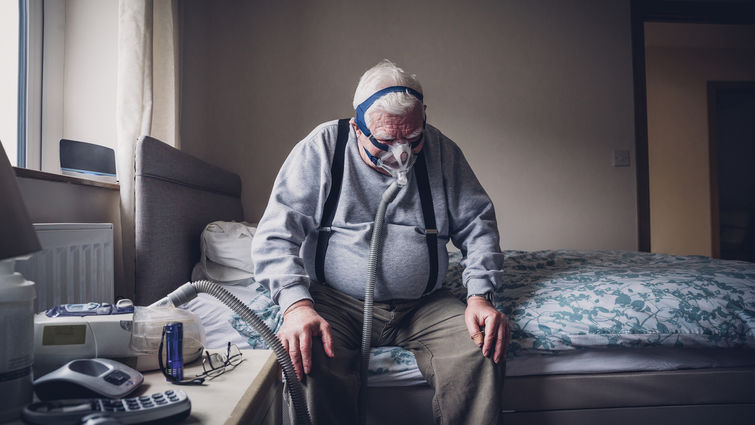
Elderly Man Using a Medical Breathing Apparatus stock photo
Untreated, obstructive sleep apnea (OSA) can increase the risk for severe COVID-19 infections, according to research within the last year. Ramiz Fargo, MD, a sleep medicine expert at Loma Linda University Health, says the usage of continuous positive airway pressure (CPAP) machines lowers risks and can prevent contracting COVID-19.
Sleep apnea is often present in older or obese individuals, Fargo says. Just one of these underlying conditions leaves a person highly susceptible to negative COVID-19 outcomes. He recommends those with sleep apnea be treated with a CPAP device, as it can decrease the odds against the shared medical risk factors.
OSA is diagnosed using special sleep testing equipment to detect the lack of airflow into or out of the nose or mouth. The CPAP machine used to treat OSA includes a mask fit over the mouth and nose during sleep. Pressure from the machine passes air through the nose and throat, splinting the closed airway open, allowing for natural breathing.
Fargo recommends using a CPAP machine at least four hours a night when diagnosed with OSA. He says those who comply with proper usage of their at-home CPAP machines are less likely to develop COVID-19 or need to be hospitalized according to a study published by the American Thoracic Society.
Actively preventing COVID-19 infection may support your odds against other sleep disorders; Fargo has seen some who have recovered from COVID-19 develop insomnia and poor sleep habits.
“This may be due to a stress response to the cough attacks, isolation, and fear of what may happen when sleeping,” Fargo says.
Fargo says a good night’s rest is more than feeling rested through the day. The more fatigued our bodies are, the more immunocompromised they are. This leaves us vulnerable to many diseases and infections, including COVID-19.
“It’s important for all of us to recognize the habits that don’t encourage healthy sleep,” Fargo says. “Put down the electronics and try to get eight hours of sleep each night.”
Fargo and his team at the Sleep Disorders Center are dedicated to helping children and adults obtain restful sleep and live healthy and productive lives. Learn more about the services provided here.
